
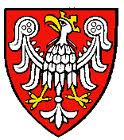





1300 World population decreased from 400M in 1250 to 392M (vs. 393M in 1200), becoming the first known time that it decreased (until ?), due to the super-cruel-and-bloody Mongol expansion. Millennium Fever is at a peak this year, with many Germans believing that Antichrist HRE Frederick I Barbarossa (1122-90) will return to chastise the Church before the Second Coming of Christ; Franciscan preacher Fra Dolcino (1250-1307), fired by the MF theories of Gioacchino da Fiore founds the Apostolic Brethren (ends 1307), claiming that the authority of the Church has passed from the popes to them, and that the corrupt pope and clergy will be destroyed by the Last Emperor before the New Age of the Spirit, which gets him burnt at the stake in 1307 after he turns to guerrilla warfare. Despite all the wars, famine and disease, Dick Almighty wins out, and the pop. of Europe has grown 2.5x since the year 1000; Britain: from 2M to 5M; France: from 7M to 16M; Germany and Scandinavia: from 4M to 11.5M; Italy (incl. Sicily): from 5M to 10M; Spain: from 7M to 9M; Paris: 200K; Milan, Florence and Venice: 80K; London, Cologne and Barcelona 40K; Rome, Naples, Prague, Vienna and Lisbon: 20K; Dublin 10K; don't worry about overpop., the Black Death is just around the corner? About this time farm expansion in Europe halts because of the Little Ice Age (begun 1250), which lasts until 1850; less cattle is raised, and the herring supply starts to slide; food production slides in Greenland and Scandinavia, and the coast of Greenland grows icebound, causing the settlements to dwindle; Greenland has a pop. of 3K colonists living on 300 farms along the W coast, but the worsening weather dooms them to eventual near-extinction. In Jan. after invading Flanders last year, the French capture Count Guy of Flanders (1226-1305) and his son Robert of Bethune (Béthune) (1249-1322); Guy is released in 1302 to negotiate terms after the French V at the Battle of the Golden Spurs, and imprisoned again in 1304 in Compiegne until his Mar. 7, 1305 death, after which Robert is released. On Feb. 22 Pope Boniface VIII proclaims the first Christian Jubilee with the bull Antiquorum Habet Fide, and officially inaugurates it on June 29 (feast of St. Peter and St. Paul), adding a 2nd crown to the papal tiara to indicate his temporal power; since he did it all to make money for the Church, Dante later depicts him in Hell; too bad, the throngs of thousands of pilgrims who adore the pope made him feel invulnerable to the French monarchy? In May Robert the Bruce is ousted as joint guardian of Scotland in favor of Sir Ingram (Enguerrand) de Umfraville (-1321), a kinsman of King John I Balliol and ally of John III "Black" Comyn, Lord of Badenoch (1242-1302); Edward I invades Scotland and refuses a personal demand from John Comyn to restore King John Balliol and give up Scottish lands; continued diplomatic pressure from France and Rome (where Wallace is acting as an envoy, and has a letter from Philip IV asking Pope Boniface VIII to help him) forces Edward I to sign a truce; too bad, the Scots continue their pesky raids into N England, pissing-off Edward I and making him put pressure on the Scottish nobles to betray Wallace. The Polish nobles begin a revolt against Polish king Wladislaw I Lokietek; on July 25 Wenceslaus II Premyslid (1271-1305) of Bohemia is elected and crowned king of Poland (until June 21, 1305), but pissed-off claimants from the Piast Family (whose armorial features a silver eagle on a red field) challenge him. Albert I attempts to add Holland and Zeeland to the Hapsburg domains; a revolt backed by the Rhenish electors is supported by Pope Boniface VIII. The Swedes found a settlement on the Neva River Delta, along with a fortress commanding the approach to the river (until 1703). Pope Boniface VIII issues the bull De Sepulturis, forbidding the practice of cutting up corpses of dead Crusaders and boiling them down to send their bones back home; it doesn't prohibit medical dissection? The Mongols invading Syria and sieging Damascus retreat across the Euphrates River to face an invasion by the Chagatai Khanate led by Khan Kaidu (1230-1301), who is defeated and KIA near Karakorum next year; the Marionites and Druzes fail to keep control of Syria and Palestine, which is soon retaken by the Mamluks; meanwhile Harran-born Islamic scholar Ibn Taymiyyah (1263-1328), who preaches a puritan bare-bones form of Islam for Salafis (Arab. "Salaf us Saleh" = righteous predecessors) that eschews foreign innovations (Arab. "bid'a") issues a fatwa declaring that jihad upon the Mongols is obligatory even though they converted to Islam because they rule under the manmade Yassa Code of Genghis Khan rather than Sharia; it takes cents. for his teachings to give birth to Wahhabism. Early in this cent. the Anasazi culture (Mesa Verde) disappears (drought?); did they leave a painting of a tenontosaurus?; the Pueblo III Period (begun 1150) ends, and the Pueblo IV Period begins in SW North Am. (ends 1600); Athabascan Indians begin migrating from the NW, taking over SW North Am. by 1500. Early in this cent. (late in the 13th cent.?) the practice of the Running of the Bulls in NE Spain begins, becoming an annual event in Pamplona at the Festival of San Fermin since its inception in 1591. About this time the Kingdom of Buganda in modern-day C Uganda incl. Kampala is founded by Kato Kintu Kakulukuku, who becomes the first king (kabaka); according to them, Kintu was the first person on Earth; his son Chwa I Nabakka succeeds as kabaka #2. In this cent. the Romani (Romany) (Roma) (Gypsy) (called Gypsies in the mistaken belief that they are from Egypt) people from NW India reach SE Europe, becoming its largest minority group (until ?), reaching 11M by modern times. About this time the city of Warsaw (Warszawa) (modern-day pop. 1.76M/3.1M) on the Vistula River in EC Poland is founded by Boleslaw II of Masovia, Prince of Plock, becoming the official capital of the Masovian Duchy in 1413 before being incorporated into the Crown of the Kingdom of Poland in 1526; in 1569 it becomes the seat of the Gen. Sejm, going on to become known as "the Paris of the East" until the German invasion of 1939, the Warsaw Ghetto Uprising in 1943, and the Warsaw Uprising of 1944, which destroys over 85% of its bldgs.; after WWII it becomes known as "the Phoenix City" for its reconstruction efforts. By this year Giotto is working in Assisi, Italy. About this time the Mayas of Yucatan begin an incessant warfare, which softens them up and causes their civilization to begin declining. About this time the Incas settle around Cuzco in Peru. In this decade the monastic revival in England, which started with the Norman Conquest in 1066 ends. In this cent. the Teutonic Order (Knights) of Roman Catholic Huns, er, Germans begin penetrating Poland, settling 650 districts with Germans, who form the middle class, pissing-off the native nobles a nd rulers; meanwhile the powerful lords of E Europe reverse 2.5 cents. of progress for serfs, and begin reducing them to... er, serfdom? In this cent. the 14 Tribes of Galway (merchant families) rule Galway, Ireland (until the 17th cent.). In this cent. sea trade replaces mainland fairs in Europe, with large 3-masted carracks linking Normandy, Spain, Italy et al. Early in this cent. surnames in the British Isles begin to be fixed. In this cent. the Assumpsit (Lat. "he has undertaken") form of action at common law originates in England when litigants seeking justice in the royal courts turn from the writs of covenant and debt to the trespass on the case, becoming the beginning of modern contract law incl. unjust enrichment. Early in this cent. Europeans begin exterminating cats, just in time to make them defenseless against the rat-borne bubonic plague? In this cent. the word "fun", based on "fon" (a fool or jester, a person who likes to fonnen) comes into the English language, meaning trick, hoax, or joke. About this time Dutch-speaking Ypres (Ieper) in West Flanders becomes famous as a center of the textile industry using the flax of Flanders. In this decade the European slave trade of mainly Slavs temporarily ends. In this decade trade fairs are held in Bruges, Antwerp, Lyons, and Geneva. In this cent. Jongleurs (prof. musical entertainers) blossom in France. In this cent. Benedictine monk Sidone Benoit (Benoît) of the Abbaye-aux-Hommes in Caen in the Calvados dept. in Basse-Normandie, France invents the dish Tripes à la mode de Caen by adding apple cider and apple brandy to bland tasteless tripe - the French taste the forbidden apple and sell their souls to the Devil forever? In this cent. the Buddhist vacuum in Bengal causes those not converted to Islam to adopt Sufism and bhakti (pr. BUCK-tee), single-minded devotion to one Hindu god, who gets endless baksheesh - it's the new Mother Nature taking over? In this cent. the Worshipful Co. of Brewers is founded in London, England, receiving a royal charter in 1438 fom Henry VI. Architecture: The Church of St. Mary the Virgin in Oxford, England is begun (finished 1498). In this cent. the Old Cathedral of St. Machar is built in Aberdeen in N Scotland, becoming the only all-granite cathedral in the British Isles. In this cent. the 4-story Casa Grande Ruins are built in the Gila River Valley in C Ariz. between the Gila and Santa Cruz Rivers; they are discovered in 1694, two cents. after they were deserted by people who first came in the 1st cent.; becomes a U.S. nat. monument in 1918. Inventions: In this cent. Cast iron becomes widely available in Europe; in this cent. Sheffield, England in South Yorkshire (built on seven hills like Rome and Prague) becomes known for manufacturing cutlery, becoming the #1 center by 1600. About this time Spanish alchemist and papal physician Arnau (Arnaud) (Arnaldus) de Villanova (Villanueva) (1238-1311) invents Brandy (Brandywine) (AKA Fire Wine) by distilling wine; enterprising copycat Irish monks soon invent Usquebaugh (Uisgebeatha) (Whisky) (Whiskey) (Gael. "water of life") by distilling fermenting grain - when does the party start? In this cent. European monks invent the Escapement Clock. This yellow century pisses me off? In this cent. urine examination becomes a means of diagnosis in European medicine; yellow stain for stained glass windows is discovered in Europe in this cent.; meanwhile in this cent. Egyptians begin drinking a type of lemonade - it couldn't be, no? Science: A Jew is appointed as regent of the faculty of the Montpellier School of Medicine in France, pissing-off the medical faculty of the U. of Paris, who don't like the theory of demonic possession of the sick and the efficacy of relics to be questioned, and force them to expel all Jews next year. Nonfiction: Anon., Liber de Coquina (Book of Cooking) (2 vols.); medieval cookbook by a French author and an Italian author from Naples. Richard of Haldingham and Lafford (AKA Richard de Bello), Prebend of Lafford in Lincoln Cathedral, Hereford Mappa Mundi (158cm x 133 cm), becoming the largest known medieval map, drawn on a single sheet of vellum, housed at Hereford Cathedral in England; places Jerusalem at the center of the world, and displays the location of Noah's Ark. Jofroi of Waterford, Catalogue of All Known Wines and Ales of Europe; Paris-based Dominicans recommend his favorites to colleagues. Poetry: In this cent. the Rondel verse form originates in France, spreading to England and Romania, a variation of the rondeau consisting of two quatrains followed by a quintet (13 lines total) or sestet (14 lines total), of the form ABba abAB abbA(B). Plays: Li Hsing Tao (Xingdao), The Chalk Circle; 16-y.-o. Hai-tang is sold into a brothel by her family, where she is befriended by wealthy tax collector Ma Chun-shing, who makes her his wife #2, after which she bears son Shoulang, making wife #1 Ah-Siu jealous, so she frames her on poisoning the hubby, then claims in court that the boy is hers so she can inherit Ma's fortune, after which Hai-tang is beaten into a confession, and is saved from execution by the emperor, who repeats the Judgment of Solomon and figures out the true mother by placing the boy in peril and seeing which one flinches. Art: Anon., Mansjusri (Monju) Seated on His Lion (hanging scroll). Duccio di Buoninsegna (1255-1319), Madonna and Child (Stoclet Madonna) (Stroganoff Madonna). Giotto (1267-1337), Boniface VIII Proclaiming the Jubilee. Giovanni Pisano (1245-1320), Madonna of Prato. Music: In this cent. the Christian hymn Jesus Christ Is Risen Today (originally "Surrexit Christus hodie") is writen by an anon. Bohemian author in Breslau and Munich; it is tr. to England in 1708 by John Baptist Walsh. Listen. Births: Chinese Mongol great khan #13 (1329) Khutughtu Khan Kusala (Mingzong) (d. 1329 on Dec. 22; eldest son of Kulug Khan (1281-1311). Greek Byzantine theologian Gregory Akindynos (Gregorius Acindynus) (d. 1348) in Prilep, Macedonia; of Bulgarian descent. German adventurer (imaginary?) Till Eulenspiegel (d. 1350) in Kneitlingen (near Brunswick); travels through N Germany, the Low Coutnries, Bohemia, and Italy playing merry pranks on everybody he can. Scottish knight Sir William Douglas of Liddesdale (d. 1353); son of Sir James Douglas of Lothian. German Dominican mystic John Tauler (d. 1361) in Strasbourg. Italian Renaissance Ponte Vecchio painter-architect Taddeo Gaddi (d. 1366) in Florence; son of Gaddo; pupil of Giotto. French top surgeon Guy de Chauliac (d. 1368) in Chaulhac, Lozere; describes the use of tight bands above and below the site of an amputation. French #1 poet-composer Guillaume de Machaut (Machault) (d. 1377) in Machault (18 mi. NE of Reims); combines trouvere forms, polyphonic techniques developed during the Gothic period, and troubadour music, causing the musicians of the papal chapel in Avignon to return to Rome and make it into the center of Euro music. Russian Orthodox metropolitan (1384-5) (St.) Dionysius I (d. 1385); feast day: July 19/Oct. 28. Deaths: Italian poet Guido Cavalcanti (b. 1255).

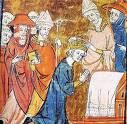




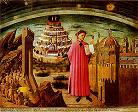
1301 Halley's Comet reappears this year, causing Giotto to transform the Star of Bethlehem into a golden comet in his 1304 painting "Adoration of the Magi". On Jan. 14 king (since 1290) Andras (Andrew) III (b. 1265) of Hungary dies, and the Arpad Dynasty (begun 855) ends; his relative Wenceslaus II of Bohemia accepts the crown of Hungary (until 1305) on behalf of his young son Wenceslaus III (b. 1289), but never rules more than part of it; meanwhile Charles Robert of Anjou (1288-1342) (future Charles I of Hungary), grandson of Maria of Hungary, daughter of Stephen V of Hungary is elected by the Croatian Sabor, and vies for the Hungarian throne with several others in a 7-year civil war. On Apr. 10 the Genoese capture the Rock of Monaco from the Grimaldis, who flee into exile and don't retake it until Sept. 12, 1331. In Oct. after the Scottish bishops send a delegation, Pope Boniface VIII pooh-poohs English claims that there is no kingdom of Scotland anymore, enforcing the old documents making it "Rome's special daughter" entitled to his personal protection, and overrides the English terms of King John Balliol's release, after which he is discharged into the custody of French king Philip IV Le Bel and allowed to live on his estates in Balieul, Picardy; meanwhile Sir William Wallace returns from France with news of possible assistance from Philip IV. In Oct. French king Philip IV arrests papal legate Bernard Saisset (1232-1314), bishop of Pamiers on treason charges and seizes his lands, which pisses-off Pope Boniface VIII, and on Dec. 5 he pub. the bull Ausculta Fili ("Listen, my son"). addressed to Philip IV, which condemns Philip's admin., rescinds his right to tax the clergy, and summons all French bishops to a council in Rome, slapping kingy in the face by denying that clergy are subject to his jurisdiction; Philip responds by summoning France's first Estates-Gen. (Etats-Generaux) of the Three Estates (nobility, clergy, townsmen) to seek their support against the pope in Paris next Apr.; the clergy, caught in the middle asks the pope to revoke his summons, and by next year the pot is on boil?; in 1769 the Estates-Gen. is replaced by the Nat. Assembly; meanwhile French Dominican theologian John the Deaf of Paris (1255-1306) writes De Potestate Regia et Papali (On Royal and Papal Power), favoring Philip IV by claiming that royal power comes not from the pope but the people, and that a pope can properly be deposed for grave crimes such as heresy; it contains the first statement of the capitalist philosophy? The new dove repair system contains a precious repairing serum? On Nov. 1 after the Guelphs controlling Florence split into White Guelphs, who want freedom from papal influence, and Black Guelphs, who support it, and the Whites expel the Blacks and snub papal ambassadors, an army led by Philip IV's brother Charles of Valois sent by pissed-off Pope Boniface VII takes Florence, destroying most of the city and killing White Guelphs, then installing a Black Guelph govt. on Nov. 7 under Messer Cante dei Gabrielli di Gubbio; meanwhile Florentine-born White Guelph Dante Alighieri (1265-1321) (who had been sent on a delegation to Rome to bargain with the pope, after which everybody but him was dismissed, catching him absent during the invasion, during which his assets were confiscated) is condemned to 2-year exile, raised to life exile after he refuses to pay a large fine with his pocket change; as the years go by and his White Guelph allies fail to retake Florence, he turns against them too and starts composing the founding document of the Italian language, the story of his pathetic unfulfilled life, La Divina Commedia (The Divine Comedy) (1304-21) ("Divina" added to the title later by Boccaccio) in 100 cantos, raising his personal friends and enemies to immortal heights and lows, esp. his dead unrequited true love babe Beatrice Portinari (1266-90) - take beano before and there'll be no gas? Comyn, Lamberton, and Umfraville resign as guardians of Scotland in favor of Sir John de Soulis (Sules) (-1310), who was appointed by Scottish King John in 1299; Edward's army occupies Glasgow. Edward I names his son Edward II the first Prince of Wales, the heir to the English throne - making a virtue out of crushing a Celtic people? The season premiere of The Bachelor on BBC? A Pretender (False) Margaret (Margaret) (Margareta) (b. 1260) is executed in Norway by Eric II, giving rise to a martyr cult, and causing Scottish chronicler Andrew of Wyntoun (1350-1425) (first to mention Robin Hood and to use the word "Catholic") to later claim her as the real Margaret and call her the innocent "Maid of Norway" - her death in 1290 was faked by a Jewish conspiracy after Edward I kicked the Jews out of England, and that's why the Scots end up beating improbable odds and establish Scotland as a safe haven for Jews and Templars for three cents., by which time another Jewish conspiracy to find a safer haven across the Pond has time to succeed? Ruknuddin dies, and his brother Shamsuddin Firuz (Firoz) Shah (-1322) becomes king of Bengal (until 1322). Edward I obtains from the pope the grant of half the proceeds of a tenth imposed on the English clergy by papal order, thus getting around the need to ask for their consent. The woolen industry town of Manchester, England (Roman town of Manutium or Mancunium) in Lancashire on the Irwell, Medlock, Irk and Tib Rivers (31 mi. E of Liverpool) receives a charter. Art: Giotto (1267-1337), The Angel Appearing to St. Anne (1302-5) (Capella degli Scrovegni, Padua); his work makes frescoes come into their own in Italy. Giovanni Pisano (1245-1320) begins decorating the pulpit in Pisa Cathedral (finished 1311). Births: Austrian Hapsburg duke (1330-9) Otto IV (the Merry) (d. 1339) on July 23 in Vienna; youngest son of Albert I (1255-1308) and Elisabeth of Tirol (1262-1312); brother of Frederick the Handsome (1289-1330) and Albert II (1298-1358). English knight William Montagu (de Montacute), 1st Earl of Salisbury, 3rd Baron Montagu, King of Mann (d. 1344) in Cassington, Oxfordshire; son of William Montagu, 2nd baron Montagu; childhood companion of Edward III. French "true and perfect knight" Count Geoffroi de Charny (d. 1356); son of Jean de Charny, lord of Lirey in Burgundy, and Margaret de Joinville, daughter of Jean de Joinville, close friend of Louis IX. Syrian Shafi'i Sunni scholar Ismail ibn Kathir (d. 1373) in Busra. Italian poet Antonio Pucci (d. 1388). Deaths: Chinese painter-poet Ni Tsan (d. 1374).





1302 In 1302-7 (1304-6?) a European drought occurs just before the onset of the Little Ice Age and the cold-wet Dantean Anomaly of the 1310s; in 1302-4 there is a drought in the Mediterranean, followed by hot dry summers N of the Alps in 1304-6. On Feb. 11 the papal bull Ausculta Fili is officially burned in Paris before Philip IV and a great crowd. In Feb. isolated Robert the Bruce resubmits to Edward I, being permitted to retain his lands and marry his 2nd wife Elizabeth de Burgh (1289-1327), daughter of Richard Og (the Young) de Burgh, 2nd Earl of Ulster (1259-1326) (AKA the Red Earl), ally of the English crown; Edward promises to back Bruce's claim to the Scottish kingship. On Apr. 10 the Estates-Gen. declares that the French king has no superior on Earth, and all three classes write to Rome separately in defense of the king and his temporal power; "Thus was the original sin of French absolutism born"; on June 13 Philip IV calls an assembly of French prelates in Paris, which trumps up charges on Pope Boniface VIII of illegally gaining the papacy, simony, heresy, and sexual perversion, and calls for a gen. church council to depose him. On May 18 (night) the Bruges Matins Massacre sees Flemish workers in Bruges rebel against high taxes and drive out the French garrison; on July 11 Philip IV's well-equipped knights wearing golden spurs are defeated by a ragtag Flemish army made up almost entirely of foot soldiers wielding the good-n-sharp goedendag at the Battle of the Golden Spurs (Courtrai) near Courtrai, Belgium, and all of the French army leaders and some of Philip IV's councillors are KIA; the myth of the invincibility of knights in armor is shattered, and all hopes for the return of Scottish king John Balliol backed by a French-Scottish army are kaput, showing how smart or lucky Robert the Bruce was to suck up to Edward I earlier in the year?; Count Guy of Flanders is released by the French to help negotiate terms, but they refuse. On July 27 Osman I defeats 2K Byzantines under Hetaereiarch Muzalon at the Battle of Baphaeon (Bapheus) on the SE shores of the Sea of Marmara outside Nicomedia near Nicaea (Iznik), then captures and renames Yenisheheer (Yenishehir) ("New City") in Thessaly between Nicaea and Brusa, making it the capital of his new empire; the Byzantines take his name as Othman and call his followers Ottomans; he begins steadily expanding his territory in Bithynia, but the fortified Byzantine cities prove too much for his light arms, and all he can capture are the smaller forts? On Aug. 31 the Sicilian conflict ends with the Peace of Caltabellotta; Aragonese control of Sicily is accepted; Frederick III is allowed to remain King of Trinacria (Sicily) during his lifetime, whereupon the island reverts to the king of Naples; he spends the rest of his life trying to get out of the deal, keeping Sicily under Aragonese control but never reuniting the island with its mainland territories; as part of the deal Frederick marries Eleanor of Anjou (1289-1341), daughter of Charles II of Anjou; after Caltabellotta, the Spanish mercenaries known as the Almogavares join the Co. of Catalan under defrocked Templar Roger di Flor (Roger Blum) (-1306), and together they enter the service of Byzantine emperor Andronicus II as condottieri to fight the Ottomans. In Oct. 45 French prelates defy Philip IV to attend a council in Rome; on Nov. 18 after hearing of the French defeat, Pope Boniface VIII responds to the Estates Gen. by issuing the bull Unam Sanctam (The One Holy Catholic and Apostolic Church), declaring the supremacy of the Church to the secular govt. in all things, and asserting absolute papal jurisdiction over laymen vis a vis kings based on his right to correct sin, becoming the last papal claim to superiority over lay rulers until ?, with the soundbyte: "It is necessary to salvation that every human creature be subject to the Roman pontiff", to which one of Philip IV's ministers utters the soundbyte: "My master's sword is made of steel, the pope's is made of verbiage"; no surprise, ignoring the pope's many threats, Philip IV issues the official answer De Potestate Regia et Papali (On Royal and Papal Power), written by learned Dominican friar John of Paris (-1306), defending the authority of the king and denying the ownership of ecclesiastical property by the pope; meanwhile Philip IV sends his pope-hating councillor Guillaume (William) de Nogaret (1260-1313) (a lawyer born in Languedac, where he witnessed the Inquisition, turning him against the Church for life) to kidnap the pope and bring him to France for trial on his council's trumped-up charges. After Albert I suppresses the Rhenish revolt, Pope Boniface VIII accepts him as HRE. The merchants of Gascony, France receive special privileges from the English crown. Births: English noble Edouard de Bar (d. 1336); nephew of Edward II; grandson Ahmad ibn Naqib al-Misri (d. 1367) in Cairo. Deaths: Italian Florentine painter Cimabue (b. 1240).





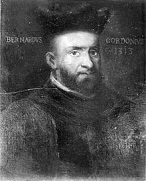
1303 On Feb. 24 after Crusader king Edward I Longshanks (1239-1307), the Hammer of the Scots, king of England, duke of Gascony, incl. parts of Ireland, the Channel Islands (Iles Normandes), and Wales invades Scotland again, he is stopped at the Battle of Roslin in Roslin Glen near Edinburgh by John Comyn, Sir William Wallace, and Wallace's kinsman Sir Symon (Simon) Fraser (-1306) (Wallace refuses the command because of his defeat at Falkirk); in May Edward I invades again with a full-strength force, with Robert the Bruce, who is made sheriff of Lanark and keeper of Ayr Castle supplying troops to aid him; Wallace gains financial support from Bishop Wishart of Glasgow to continue the struggle; Edward I being nicely occupied, Philip IV goes to Plan B, claiming to be overlord of Gascony, and encouraging vassals to appeal from the English court to his, and generally seeking to undermine the English admin. of Gascony. On Apr. 20 the Sapienza U. of Rome is founded by Pope Boniface VIII via the bull In Supremae Praeminentia Dignitatis, "in that Rome may become the fruitful mother of science"; in 1431 Pope Eugene IV reorganizes it, creating schools of law, medicine, philosophy, and the theology, paying for it with a wine tax; it is destroyed during the 1527 Sack of Rome, and rebuilt in 1535 by Pope Paul III; in 1703 Pope Clement XI founds a botanical garden on the Janiculum; in 1870 it goes secular, going on to become the largest Euro univ. by enrollments in modern times; Pope Boniface VIII also founds the U. of Avignon in Avignon, France, starting out with faculties of civil and ecclesiastical law, followed in 1413 by theology, followed in the 16th cent. by medicine; it is closed in 1792 during the French Rev. On Apr. 20-22 the decisive Battle of Marj al-Saffar (Shaqhab) near Kiswe, Syria (S of Damascus) ends the Mongol threat to the West, saving Syria for the Mamluks, and Europe for Christianity?; the Mongols come and go in 40 years after turning Asia from 100+ thriving cities into a poverty-stricken hellhole, which continues to modern times. In Aug. pope (since Dec. 24, 1294) Boniface VIII (b. 1235) prepares a bull to be pub. on Sept. 8, declaring Philip IV automatically excommunicated for preventing the French bishops from going to Rome, and absolves his subjects of any need for acknowledging his authority; too bad, the news is leaked, and one day before he can proclaim it, on Sept. 7 the Outrage of Anagni sees the papal Gaetani Palace in Anagni in C Italy attacked by Philip IV's pope-hating councilor Guillaume (William) of Nogaret (1260-1313), Sciarra (Giacomo) Colonna (1270-1329) (one of the pope's bitterest enemies and brother of Stefano Colonna the Elder (1265-1348)) plus 2K mercenaries, and he is jerked from bed, threatened with death, slapped in the face by Sciarra, and captured after trying to get him to resign; the local townspeople become outraged, causing Nogaret and Colonna to flee, and the pope is released after three days, then taken to the Vatican by the Orsini family, where he dies on Oct. 11 of a fever, a broken man; on Oct. 22 Master Gen. of the Dominican Order Nicholas Boccasini (absent from Rome during the troubles) is elected Pope (#193) Benedict XI (1240-1304), and he immediately caves in, dismisses all blame for the attack at Anagni and reverses Boniface VIII's actions (official coverstory: tried and convicted for heresy, rape, sodomy, and eating meat during Lent, he skipped his trial and escaped punishment, only to go mad and commit suicide?), renews the royal right to tax the clergy, restores peace with Philip IV's court, and withdraws to Perugia. In Sept. the Co. of Catalan arrives in Constantinople, and ends up in a bloody street fight with the local Genoese community, getting shipped out to fight the Turkish siege of Philadelphia, but ends up in another fight with the Alans; they then ravage the area around Constantinople like brigands and freebooters. Edward I grants the Carta Mercatoria (Merchant's Charter), allowing foreign merchants free entry and exit from England with their goods in return for reciprocal privileges; it arouses opposition and is revoked by Edwad II, but is gradually reestablished, and endures two cents., although the Hanseatic League does everything it can to avoid the reciprocal part. Philip IV of France creates the Court of Auditors in Paris in the Palais de la Cite to audit the royal household incl. revenue from crown estates and public spending; it is abolished on Sept. 17-29, 1791 during the French Rev. The Armagh succession passes from mainly Gaelic Irish to a series of Anglo-Irish prelates, and after Dionysius is never consecrated and resigns, on Aug. 27, 1306 John Taaffe (-1307) is appointed, followed by Walter Joyce (Jorz) (1307-11), Roland Jorz (1311-22), Science: Bernard de Gordon, prof. of medicine at the U. of Montpellier, France makes the first Euro medical reference to spectacles. Nonfiction: Pietro d'Abano (1250-1316), Conciliator Differentiarum, quæ inter Philosophos et Medicos Versantur; an Averroist prof. of medicine at the U. of Padua attempts to harmonize medical and philosophical theory; teaches that the brain is the source of the nerves, and the heart of the blood vessels, and measures the year as 365 days 6 hours 4 min.; too bad, his claim that all causation is caused by the stars, eliminating God from the equation gets him accused of heresy, but his patients Pope Honorius IV and Marquis Azzo d'Este protect him until 1315, when he escapes an Inquisition trial by a natural death, his friends hiding his body so well they have to execute him in effigy. Chu Shih-chieh (1249-1314), Szu-yuen Yu-chien (The Jade Mirror of the Four Unknowns/Origins) (3 vols.), 288 algebra problems incl. quadratic and cubic equations, series and progressions, describing Pascal's Triangle; it covers the Tian yuan shu (Method of the heavenly element/celestial unknosn) system for solving polynomial equations. Bernard de Gordon, Practica seu Lilium Medicinae; describes anthrax, plague, TB, scabies, epilepsy, and leprosy; first medical reference to spectacles; by a prof. of medicine at the U. of Montpelier. Poetry: Robert Mannyng (1260-1340), Handlyng Synne; 13K lines; an adaptation of William of Waddington's "Manual of Sins" (Manuel des Pechiez), written during the reign of Edward I. Births: Burmese Hanthawaddy king #4 (1323-30) Saw Zein (d. 1330) on June 2. Swedish nun ("Seeress from the North") (founder of the Bridgittine Order) (St.) Bridget (Brigit) (Birgitta Birgersdotter) (d. 1373) (Nor. "splendid") in Finstad, Uppland; of noble parentage; mother of St. Catherine of Vadstena (1332-81); feast day: Oct. 8. Deaths: Italian pope (1294-1303) Boniface VIII (b. 1235) on Oct. 11 in Rome.



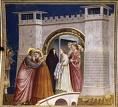
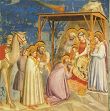
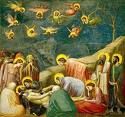

1304 On Feb. 9 after Sir William Wallace's small force is defeated by an army of English knights and troops of Robert the Bruce at Sir Symon Fraser's estate at the Battle of Happrew in Peeblesshire, causing Wallace to become a fugitive, Scotland surrenders; the Parliament of St. Andrews incl. the nobility and 129 landowners declares Sir William Wallace an outlaw, and comes to terms with Edward I to save themselves from more bloodshed; after building War Wolf (Ludgar), the biggest trebuchet in Europe, Edward I lays siege to Stirling Castle, the last major fortification to resist his army, and after it surrenders before being bombarded, but Edward I wants to have some amusement, having it batter down some walls while some noblewomen watch in a specially-built shelter, it surrenders in June (until 1314); meanwhile in Apr. Robert the Bruce's daddy dies, and he begins flopping against Edward I, stalling in sending the trebuchet to Stirling while beginning secret negotiations with Bishop William Lamberton and other Scot patriot leaders to finally dump King Empty Coat John Balliol for him, since he believed that the crown should have been given to his grandfather Robert the Bruce; too bad, Bruce involves old rival John Comyn (a relative of the Balliols) in his secret plot, promising him lands if he will help him win the crown; Edward I should have hanged Lamberton and other Scottish bishops along with Wallace? On May 11 Muslim Persian Mongol khan (since 1295) Mahmud Ghazan (b. 1271) dies after failing to create a Franco-Mongol alliance then going Muslim and persecuting Christians and Jews, and his brother (son of Arghun) (great-grandson of Hulagu) (baptized as a Christian but converted to Sunni Islam with his brother Ghazan, then converted to Shia Islam by his wife) Oljeitu (Oljaitu) (Uljeitu) ("blessed") (1280-1316) (AKA Muhammad Khodabandeh or Muhammad the Man of God) becomes Mongol Ilkhanid khan #8 (until Dec. 16, 1316), going on to convert from Sunni to Shiite Islam in 1310 while continuing the policy of making a Franco-Mongol alliance aainst the Egyptian Mamluks despite their being Sunni Muslim, sending embassies in 1305, 1307, and 1313, after which the 1322 Treaty of Aleppo causes them to make up with the Mamluks; meanwhile in 1307 Oljeitu moves the capital SE from Tabriz to the new town of Soltaniyeh (Sultaniyeh) (near Qazvin) in Zanjan Province of E Azerbaijan (140 mi. NW of Tehran), and builds his mausoleum there, the Soltaniyeh Dome, the first double-shell dome, with six minarets. On July 7 1304 after excommunicating Bishop Guillaume (William) of Nogaret, then getting poisoned by a tainted fig, Pope (since 1303) Benedict XI dies; guess who is suspected?; a conclave begins in July, but can't decide on a new pope until next June. On ? Guy of Namur (Dampierre), Count of Zeeland (1272-1311) defeats Count William I of Hainaut (1286-1337), son of Count John II of Avenes at the Battle of Duiveland Island, taking Bishop Guy of Utrecht prisoner; Guy then allies with Duke John II the Peaceful of Brabant (1275-1312) to conquer most of Utrecht, Zeeland, and Holland, but William I defeats him on Aug. 10-11 at the Battle of Zierikzee, destroying a Flemish fleet, after which on Aug. 19 the Battle of Mons-en-Pevele (Mons-en-Pévèle), sees a French army led by Philip IV the Fair in person get revenge for the 1302 Battle of the Golden Spurs, uniting with the armies of Holland and Hainaut, defeating the Flemish, who parley around 6:00 p.m., only to surprise-attack and almost kill Philip until William the Younger of Julich is KIA, causing them to withdraw, with both sides claiming a V; the French go on to conquer Douai and Orchies and burn Seclin. After Albert I of Hapsburg and Pope Boniface VIII demand that Wenceslaus II give up Poland and Hungary and the rights to the silver mines of Kutna Hora, Albert I invades, and Wenceslaus repulses him and prepares to invade Austria. Mongol Persian ilkhan (viceroy) (since 1295) Ghazan (Mahmud) dies after declaring Islam the state religion, and his brother Uljaitu (Uljaytu) (Oljeitu) ("blessed") (1280-1316) AKA as Muhammad Khodabandeh (Pers. "man of God") succeeds as Ilkhanid khan #8 in Tabriz (until 1316). Franciscan missionary Oderico (Odoric) da Pordenone (1286-1331) sets out to retrace Marco Polo's journeys to China - somewhere beyond the sea, somwhere waiting for me? Architecture: The Church of San Domenico in Perugia, Italy is completed; rebuilt in 1614, becoming the largest church in Umbria. Art: Giotto (1267-1337), Adoration of the Magi (Three Wise Men) (Scrovegni Chapel, Padua); shows the Star of Bethlehem as Halley's Comet, which appeared in 1301; Joachim and Anne Meeting at the Golden Gate (Scrovegni Chapel, Padua) (1304-06); The Lamentation of Christ (1304-6) (Scrovegni Chapel, Padua). Births: Moroccan Muslim world traveler and writer Muhammad Ibn Abdullah Ibn Battuta (Batutah) (d. 1377) on Feb. 25 in Tangier. Italian (Florentine) scholar-poet (the first humanist?) Francesco Petrarch (Petrarca) (d. 1374) on July 20 in Arezzo. Chinese Mongol Yuan emperor #7 (1328-32) Tugh Temur (d. 1332); brother of Khoshila (Yuan Wen Zong) (-1329). Sicilian king (1337-42) (idiot?) Peter II (d. 1342); son of Frederick III and Eleanor, daughter of Charles II of Naples; husband of Elisabeth of Carinthia; father of Louis of Sicily, Frederick IV of Sicily, Constance of Sicily, Queen Eleanor of Aragon, Electress Palatine Beatrice, and Euphemia of Sicily. Deaths: Japanese Yamato emperor #89 (1246-60) Go-Fukakusa (b. 1243) on Aug. 17. German minnesinger Rudiger Manesse; leaves the Codex Manesse, collection of minnesinger songs. Deaths: English nobleman John de Warenne, 6th earl of Surrey (b. 1231) on Sept. 29 in Kennington, Kent. Dutch count of Holland (1299-1304) John II of Avesnes (b. 1247) on Aug. 22.
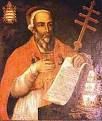


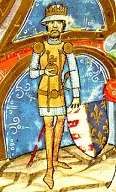
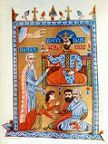
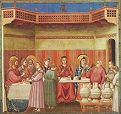
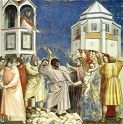
1305 On June 5 supposedly without French pressure, one of Philip IV's supporters, Frenchman Bertrand de Got, archbishop of Bordeaux is elected Pope (#194) Clement V (1264-1314); he then supposedly gets convinced of the Church's need for support by the French monarchy, continues Benedict XI's work of revoking Boniface VIII's anti-Philip acts, and chooses 12 new cardinals, nine of them French; he absolves Edward I from his 1296 oath taken in confirmation of the Charters, suspends the archbishop of Canterbury from office, and commands the English clergy to pay the king a tenth for seven years; in return Edward allows the pope to levy a new tax called annates (appointment tax) upon the British clergy, consisting of half of the first year's profits ("first fruits"), but it proves unpopular; Clement V goes on to have the body of his predecessor Boniface VIII exhumed and burned as a heretic. Nice work if you can get it? On June 21 Wenceslaus II (b. 1271) dies while planning an invasion of Austria, and his 16-y.-o. son Wenceslas III Premyslid (1289-1306) becomes king of Bohemia (until 1306), renouncing the Hungarian crown on Dec. 6 to Duke Otto of Lower Bavaria (until 1308). On June 23 the Treaty of Athis-sur-Orge is signed; the French recognize Flemish independence as a fief of France after they surrender Lilloise Flanders (Lille, Douai, and Orchies), ending the Franco-Flemish War (begun 1297); Guy of Dampiere's eldest son Robert III of Flanders (1249-1322), "the Lion of Flanders" is recognized as count of Flanders (until 1322); William I reconquers the lost territories and becomes Count William III of Holland and Count William II of Zeeland (until 1337), taking until 1323 to get the counts of Flanders to renounce all claims on Zeeland; meanwhile he marries his daughters off to the HRE, king of England et al., and marries the sister of the king of France, causing him to become known as the "Father-in-Law of Europe". Case closed on a pesky rebel, or, Put a little love in your heart, or, Anybody got a canopic jar, er, forget it? On Aug. 5 after the great landowners and his mentor Bishop Robert Wishart sell him out for peace and accept Edward I's terms, Scottish hero Sir William Wallace (1272-1305) (same age as Christ when he was crucified?) meets ancient hero Spartacus in the Twilight Zone when he is betrayed and captured (in his bed, or after putting up a big fight?) by turncoat Scottish rebel Sir John de Montieth (Monteith) (1275-1323) in Robroyston near Glasgow (while on the way to meet Robert the Bruce?); the turncoat is rewarded by Edward I with the governorship of Dumbarton; Mel, er, William is taken to London on Aug. 22 and paraded through the streets of Fenchurch, where the crowd pelts the perceived killer of their innocent relatives with rotten food; on Aug. 23 he is brought to Westminster Hall and forced to stand on a platform (wearing a crown of thorns?) before a magisterial panel appointed by Edward I, which railroads him on tree-tree-treason and murder charges without a real trial (not allowed to speak in his defense; or allowed to say that he never swore allegiance to Edward I); he is then immediately wrapped in oxhide and dragged several mi. to Smithfield in NW London, then hammed, er, hanged, drawn (disemboweled and castrated, and his entrails set on fire while still attached to him?), beheaded, then quartered; the pieces are sent to the four quarters of England (Newcastle-upon-Tyne, Berwick, Perth, and Stirling) and the boiled head tarred and set on a pike on London Bridge (the Mel Gibson love affair with Sophie Marceau is moose hockey, as Isabella is only 10-y.-o. and still in France, and Longshanks isn't on his deathbed, as he lives another two years?); in Sept. a new constitution partitions Scotland (which is no longer considered a kingdom) into four judicial areas, effectively absorbing it into England, earning Edward I the title of Hammer of the Scots; too bad, the people of Scot Scot Scotland don't give up that easy, and Robert the Bruce freaks and begins the liberation of Scotland using martyred Wallace (now the Scottish nat. hero) as the rallying cry, proclaiming himself king and gaining a large popular following among the Celtic highlands and Saxon lowlands, although the nobles are slow to join him; meanwhile Edward I claims that he has saved Scotland from civil war, keeps pressing his doubtfully legal feudal claim, and calls Bruce a boat-rocker and Hun trying to stop the inevitable advance of civilization, that is, English-style, which only solidifies nat. animosity and makes any kind of union impossible for centuries?; on Aug. 22, 2005 a Tartan Day Parade is held in New York City in memory of Wallace, along with his Claymore. On Nov. 18 duke (since Oct. 8, 1286) John II (b. 1239) dies, and his son Arthur II (1261-1312) becomes duke of Brittany (until Aug. 27, 1312); next Oct. 15 he gives his brother John of Brittany (de Bretagne) (1266-1334) the earldom of Richmond in N England (3rd earl) - you take on the pesky Scots for awhile? On Dec. 6 after Wenceslaus III of Bohemia renounces his claim, and he disguises himself as a merchant to beat a blockade by Albert I of Germany and reach Buda in Nov. duke of Lower Bavaria (since Feb. 3, 1290) Otto II (1261-1312) is crowned king of Hungary in Szekesfehervar (until 1308), calling himself Bela V; too bad, rival claimant Charles I of Anjou (1288-1342) goes on next year to occupy Esztergom, Szepes Castle, and Zolyom, followed by Buda. After inflation devalues the currency by 65%, Philip IV is driven by a riot to seek refuge in the Paris HQ of the Knights Templar; too bad, they don't know what he's planning or they'd chuck him to the mob? The first explicit use of habeas corpus is made in England as a writ to bring a prisoner to court to testify in a trial. Edward I standardizes the inch (equal to three dry barley grains laid end-to-end), the foot (12 inches), the yard (3 feet) and the acre (40 rods by 4 rods, where one rod is 16.5 feet) - adding to his name for the English history books, while William Wallace is laundered out, becoming at most a footnote illustrating how pesky rebels get what's coming to them? Hetum II the One-Eyed (b. 1266) abdicates (and dies in 1307), and Levon (Leo) IV of Cyprus (1289-1307), son of Theodore III becomes king of Lesser Armenia (Cilicia) (until 1307); meanwhile Hetum's brother Oshin (son of Levon III) vies for the throne. Joanna dies, and Louis of Champagne (-1316) becomes the last count of Champagne - prost? Art: Florentine painter Giotto di Bondone (1267-1337) is asked to paint a series of 38 frescoes in the St. Maria Annunziata dell' Arena Chapel in Padua on the subject of the lives of Jesus and the Virgin Mary, and he demonstrates his new style of painting that breaks 500 years of Byzantine tradition, incl. The Life of Christ, Flight into Egypt, The Ascension of the Savior and The Last Judgment; he also paints Massacre of the Innocents for the Scrovegni Chapel in Padua, Joachim with the Shepherds (Joachim Takes Refuge in the Wilderness), and Navicella (1305-13) for St. Peter's in Rome, a mosaic depicting Christ saving St. Peter from the waves. Nonfiction: Pietro Crescenzi (1233-1320), Opus Ruralium Commodorum; first European book on agriculture since the 2nd cent., by a Bolognese agriculturist. Deaths: Dutch count of Flanders (1246-1305) Guy of Dampierre (b. 1226) on Mar. 7 in Compiegne. French duke of Brittany (1286-1305) John II (b. 1239) on Nov. 18 in Lyon. French writer Jean de Meun (b. 1240) in Paris. Italian monk St. Nicholas of Tolentino (b. 1246); canonized by Pope Eugene IV after the learned doctors of the Church confirm that he resurrected 100+ dead children? Japanese Yamato emperor #90 (1259-74) Kameyama (b. 1249) on Oct. 4. Greek emperor of Nicaea (1258-61) John IV Laskaris (b. 1250). Spanish Jewish rabbi Moses de Leon (b. 1250). French queen (1285-1305) Jeanne I of Navarre (b. 1271) on Apr. 4. Bohemian king (1278-1305) and Polish king (1300-5) Wenceslaus II (b. 1271) on June 21. Scottish hero Sir William Wallace (b. 1272) on Aug. 23 in Smithfield (executed); "Freedom is best, I tell thee true, of all things to be won/ Then never live within the bond of slavery, my son"; in the 1470s Blind Harry (1440-92) writes the 300-page verse history The Wallace, making him bigger than the Bruce, and monuments are erected at Edinburgh Castle (with Bruce on the other side), Lanark above the door of the parish church on High St., and at Stirling, which becomes the Scottish Nat. Wallace Monument.
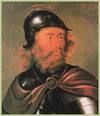


1306 Gerard of Poehlde predicted the end of the world this year back in 1147, since it's 1K years after the start of Roman emperor Constantine the Great's reign. On Jan. 27 Pope Clement V pub. a bull establishing the U. of Orleans in France (founded 1235) is granted title and privileges; in 1793 the French Rev. closes it down, and in 1808 it merges with the U. of France; a modern univ. is founded in 1960. In Jan. John Comyn betrays Robert the Bruce to Edward I, but Bruce is tipped off and barely escapes from London; the two meet on Feb. 10 at Greyfriars Church in Dumfries on holy ground between their lands, and after an argument where Bruce lets the cat that he's onto him out of the bag, and Comyn allegedly strikes first, Bruce "struck with his foot and sword", Comyn's uncle attacks Bruce and is killed by Bruce's brother-in-law, and Bruce leaves, learns that he's not dead yet, and sends his attendants to finish Comyn and his companions off (killing Comyn on the altar), becoming the first Scottish king to commit murder until James II; after getting Bishop Wishart of Glasgow to absolve him of the sacrilegious murder (self-defense, plus he didn't actually kill anybody, right?), declaring against Longshanks and rallying the Scottish nobles, on Mar. 25 he is crowned Scottish king Robert I (1274-1329) in Scone by Bishop William Lamberton, wearing robes and other trappings supplied by Wishart, in front of a small group of two earls and a handful of prelates and SW Scottish lords, founding the Bruce Dynasty (ends 1371), from which descends the Stewart line as well as the English royal Stuart line; "Black" "Good" James Douglas (1286-1330), son of Sir William Douglas the Hardy (d. 1298) (called Black by the English and Good by the Scots), who offered his allegiance to Edward I and was refused joins Robert in his coronation and goes on to become his greatest captain, winning 57 of his 70 battles; on Mar. 27 a 2nd ceremony is held after Countess Isabel MacDuff, Countess of Buchan (-1314) arrives to play the traditional role of her nephew the earl of Fife, who was absent the first time; on May 18 Pope Clement V excommunicates Bruce for killing Comyn on holy ground, and now both the English and a lot of Scots want to kick his butt? On Mar. 21 Robert II (b. 1248) dies, and his eldest son (by Agnes of France) Hugh V (1294-1315) becomes duke of Burgundy (until 1315), becoming the first to inherit the entire duchy without other children getting a piece. The Catalan Grand Co. attacks Constantinople and turns back, and on Apr. 4 Roger di Flor (b. ?) is assassinated by order of Emperor Andronicus II, causing the rest to turn W in rage and lay waste to Thrace and Macedonia. On May 22 Edward II is knighted, and his dad Edward I gives the duchy of Aquitaine to his little bugger. My life is empty without you babe? On June 19 after Edward I invades English flying the Red Dragon flag (no quarter, no rules) Robert I of Scotland is defeated by the English under the Earl of Pembroke at the Battle of Methven W of Perth, causing his band of a few hundred men (incl. Black Douglas) to become fugitives; after Bishop Robert Wishart is captured and his brother Neil KIA, Robert flees on horseback to the W coast, and on July 11 is defeated by Clan MacDougall John Macdougall of Argyle, Lord of Lorne at the Battle of Dalry (Dalrigh) (Dail Righ) (Strathfillan) near Tyndrum in Perthshire, causing him to send his women N to Tain in Rossshire and Kildrummy Castle in Mar (Aberdeenshire) in care of his brother Nigel, while he and his band of brothers disappear into his childhood haunts in SW Scotland, regrouping during the winter in Rathlin Island after a bunch of narrow escapes; meanwhile all of Robert's lands are forfeited, and the Bruce women are captured, Nigel Bruce is beheaded, Bruce's sister and the Countess of Buchan locked in iron cages, and his wife held by the stankin' English for three years; Sir Symon Fraser is captured, taken to London, and hanged, drawn and quartered, his headless corpse hung again and his head set on a spike on London Bridge next to guess-who Wallace's; Bruce doesn't see his wife again for eight years. In June French king (1285-1314) Philip IV (1268-1314) gives a secret commission to Bishop William de Nogaret as part of his plans to cash out his bankers, the rich Templars, who are financial partners of the Jews; on July 21-22 Philip IV, wanting to clean France of the garbage (and help pay for his war debts) has all 100K Jews in France arrested with all goods and money confiscated, then expelled if they won't convert to his one true faith, which most don't, so after being given one day's provisions they leave and head for Flanders, Spain, or the Rhenish towns across the Rhone River; Philip IV awards a synagogue to his coachman; meanwhile England whips and expels 100K Jews who defied Edward I's 1290 expulsion order; too bad, the king's collectors go to collect on loans made by the Jews, and are so mean that the people clamor for the Jews to be allowed to return, which they do in 1315 (until 1322) - let the vacation begin? On Aug. 4 Wenceslaus III (b. 1289) is murdered in Olomouc, Moravia en route to Poland to suppress a revolt of the nobles; the Premysl Dynasty dies out; HRE Albert I gives the Bohemian crown to his son Rudolf, but the Bohemians won't accept him, and there is a 4-year interregnum; Otto III of Bavaria (1261-1312) is elevated, but can't maintain himself, and Henry of Carinthia (1265-1335), husband of Wenceslas III's sister Anna claims the crown of Hungary (until 1310). Emperor Wedem Arad of Ethiopia sends an embassy of 30 envoys seeking an audience with the king of Spain in hopes of an alliance against the Muslims, which visits Rome and Avignon, and returns via Genoa. The Muslims use some form of incendiary weapon at Gibraltar to fend off attacks by the Castilians of Ferdinand IV. After getting pissed-off at all the air pollution, Edward I bans coal; England gets the honor of enacting the first anti-pollution laws - not a misprint? Nonfiction: Qutb al-Din al-Shirazi (1236-1311), The Pearly Crown; work on Islamic Illuminist philosophy. Pierre Dubois (1255-1321), De Recuperatione Sanctae Terrae; a plea for a new crusade, combined with a French monarchy reform program and a call for a European league, as well as a call for the secularization of church property and universal education. Births: French king of Navarre (1328-43) and count of Evreux (1319-43) Philip III (d. 1343) on Mar. 27; eldest son of Louis of Evreux (1276-1319) and Marguerite d'Artois; grandson of Philip II of France; husband of Joan II of Navarre (1312-49); father of Charles II of Navarre (1332-87). Deaths: Italian Franciscan monk-poet Jacopone da Todi (b. 1230); leaves Stabat Mater; former lawyer writes it after his wife is crushed to death by a platform at a festival, causing him to become a wild raving vagabond smeared with tar and feathers and walking on all fours until he joins the Franciscan tertiaries; "Stood the mother broken-hearted/ All in tears before the cross/ While her Son hung dying;/ Through her spirit heavy-laden,/ Mourning for Him and in pain,/ Pierced a sword of grief"; "Let me by the cross be guarded,/ Saved by Christ's redeeming Passion,/ Cherished by His grace;/ When my body shall have perished,/ Let my soul in heaven's glory/ See Him face to face." French duke of Burgundy (1271-1306) Robert II (b. 1248) on Mar. 21. French theologian John of Paris (b. 1255) on Sept. 22 in Bordeaux; dies with a case pending against him for a treatise contradicting the Church doctrine on transubstantiation by promoting impanation, the doctrine that the bread continues to exist after consecration, because the body of Christ is present by assumption and is not a doctrine of faith; leaves De Antichristo, De Modo Existendi Corporis Christi in Sacramento Altaris, and Contra Corruptorem Sancti Thomae. Mongol noblewoman Khutulun (b. 1260; dies after offering to marry any man who could defeat her in wrestling, on condition that they pay her 100 horses if she wins, dying with 10,000 horses. Scottish noble John III "Black" Comyn, Lord of Badenoch (b. 1270) on Feb. 10 in Dumfries; killed by Robert the Bruce in a church. Hungarian king (1301-5) and Bohemian king (1305-6) Wenceslaus III (b. 1289) on Aug. 4 in Olomouc, Moravia (murdered). Scottish freedom fighter Sir Symon Fraser (b. ?) in London (executed). Catalan Grand Co. leader Roger di Flor (b. ?) on Apr. 4 in Adrianople (murdered).


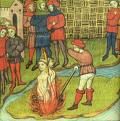






1307 In Jan. king (since 1287) Wareru (b. 1253) is assassinated by his grandsons, and his younger brother Hkun Law (1274-1311) becomes Burmese Hanthawaddy king #2 (until Mar. 1311). On Feb. 10 emperor #2 (since May 10, 1294) Temur Oljeitu (Yuan Chen Zong) dies, and on June 21 his nephew Khaisan (Khayishan) ("wall") succeeds as Mongol Yuan emperor #3 of China, taking the title Yuan Wu Zong (1281-1311) (until Jan. 27, 1311), with Oljeitu's widow Khatum Bulugan (Buluqhan) (Zibeline)(-1286) as regent; seven Mongol emperors rule China between this year and 1333. In Feb. after his brothers Thomas and Alexander are betrayed and executed as traitors Wallace-style, Robert the Bruce lands in his homelands at Carrick and begins guerrilla warfare in SW Scotland, doing the hippy hippy shake shake by leading his few hundred troops from the front and defeating the English at the Battle of Glen Trool in Galloway in Apr. and the Battle of Loudon Hill (assisted by Henry Sinclair of Rosslyn, giving him 600 troops) on May 10; lucky for him, on July 7 after launching an invasion of Scotland from Carlisle, Edward I Longshanks (b. 1239) dies in the marshes en route in Burgh-on-Sands (Burgh by Sands) near Carlisle at the "very great age" of 68, leaving the crown heavily in debt; even more lucky, on July 8 his ignorant, incompetent, pampered, gay whimp of a son (the first gay Prince of Wales?) Edward II (Edward of Carnarvon) (1284-1327) becomes the 30th monarch of England (until Jan. 20, 1327) (crowned next Feb. 25), giving the Scots something to cheer about, and women across Scotland are falling in love with because-I-said-so Bruce, who waits till the new king leaves Scotland for England in the summer to take on the pro-Balliol and pro-Comyn Scots in English pay, taking Inverlochy, Urquhart, and other castles of his enemies then razing them and burning their lands; too bad, in the winter Bruce suddenly takes ill, recovering by spring. On July 24 after losing 20K members fighting Muslims during the Crusades, resulting in a grunging mutual respect that arouses suspicions, esp. when they learn Arabic, dealing with the Assassins, and learn astrology, alchemy, and numerology (incl. forbidden rites and knowledge) (bringing chess to Europe?), the Knights Templar hold a gen. chapter meeting in Paris; pocket Pope Clement V writes to his boss Philip IV on Aug. 24 with a sealed mandate, not to be opened until dawn on Oct. 13 (Fri.), telling of his vision that the Knights Templar are heretics and blasphemers, devil worshipers, homosexuals, sodomites, defilers of Christ, and other blimey, and that God had told him to cleanse the Earth by rounding them all up and torturing them until they confess (roasting of the feet is particularly favored?); too bad, after being tipped off (by Jean de Joinville?) at midnight just before the big day dawns, Gerard de Villers flees with 50 knights and goes to sea in 18 Templar galleys under the Admiral of the Fleet in La Rochelle, carrying all their big secret documents, portable treasures, and other neat stuff, while Hugues de Chalons flees with the treasure of Hugues de Peraud, Villers and Challons being captured a few days later sans goodies; on Oct. 13 (Fri.) (Oct. 21 Gregorian) (dawn) AKA Black Friday the 13th, Templar grandmaster (since 1297) Jacques de Molay (1244-1314) is arrested in the Paris Temple by dozens of seneschals, accompanied by Philip IV, who gets pissed-off at not finding their treasure or documents; meanwhile the whole Templar Order throughout France is arrested (15K men), and its assets seized by the crown; the Order is charged with 127 blasphemous crimes; some Templars escape to Argyll, Scotland, where the war with England causes the papal bulls dissolving the order to never be proclaimed, and their allies the Freemasons protect them, admitting them into their lodges under the Accepted Rites of Freemasonry; others flee to Jewish-friendly Spain, Portugal, and Poland; de Molay's deputy Geoffroy de Charnay (1251-1314), and a few others barely survive under cruel chief torturer Gaspard Chaix, only to be burned on Mar. 18, 1314 after they refuse to give up the big secrets of where the loot is?; tortures incl. having heavy weights attached to their testicles, being jerked over heavy beams, held in dungeons for months, feet-roasting et al. - you can't take the Fifth with Clement the Fifth? After imprisoning him in 1307, Charles Robert of Anjou gets Duke Otto to abdicate the Hungarian throne, becoming undisputed king of Hungary. The Battle of Monte Rebello sees the end of Fra Dolcino and his Apostolic Brethren (founded 1260). William de Nogaret is made chancellor of France. Levon IV (b. 1289) is murdered, and Oshin I (1282-1320) becomes king of Lesser Armenia (until 1320). Sir James "Black" Douglas destroys an English garrison in his own Douglas Castle (one of three times), with so much butchery that they call it the "Douglas Larder". Lithuania annexes the city of Polotsk in Belarus by force, along with a charter of autonomy guaranteeing that the grand dukes won't "introduce new, or destroy the old", giving Lithuania control of the Dvina River trade route. Mas'ud III dies, becoming the last Seljuk sultan of the Sultanate of Rum (Roum) in Anatolia (Asia Minor) (founded 1077). Franciscan missionary John of Montecorvino (1246-1328), first Roman Catholic missionary in China is named by Pope Clement V as archbishop of Peking, and he baptizes 5K converts. After Arabic texts on alchemy get translated to Latin and spawn Euro alchemists, the Roman Catholic Church condemns alchemy as a diabolical art, which only makes it more popular? The legendary Rutli Vow of the three Swiss cantons is made, and the incident of Swiss nat. hero William Tell shooting the apple off his son's head in Uri allegedly dates to this year - a code story about the Templars not talking despite torture? 5-y.-o. Edouard de Bar (1302-36) (grandson of Edward I and nephew of Edward II) succeeds Guillaume de Gisors as grandmaster of the Priory of Sion (until 1336), which is expanded to nine commanderies (until 1481), incl. one at Gisors on the Rue de Vienne, which in the 16th cent. houses the archives of the Priory in 30 coffers :). Architecture: The 271-ft. tower of Lincoln Cathedral in England is finished. Deaths: English king Edward I (b. 1239) on July 7 near Carlisle; after his request to his son Edward II to carry his skeleton before the English army when fighting the Scots is dropped, he is buried in Westminster Abbey, with "Scotorum malleus" (Hammer of the Scots) carved on his tomb. Burmese king (1287-1307) Wareru (b. 1253) in Jan. (assassinated).
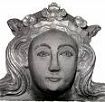

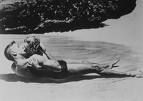
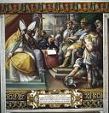




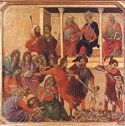
1308 Gaveston, oh Gavest-uh-uh-un? On Jan. 25 bi-curious Edward II marries 16-y.-o. 14th cent. blonde supermodel of the 14th cent. Isabella of France (1295-1358), daughter of Philip IV, described by Geoffrey of Paris as "the beauty of beauties... in the kingdom if not in all Europe"; meanwhile he angers his nobles by making his friend (and gay bud?) the earl of Cornhole, er, Gascon Piers Gaveston (Gavestone), 1st Earl of Cornwall (1284-1312) (a Gascon knight introduced by his daddy Edward I to him in 1298 as a suitable friend because of his wit, courtesy, and abilities, then exiled from court after the prince tries to bestow a title on him reserved for royalty; they ahem, don't have their first royal brat until 1312, Edward III (1312-77), followed by three more by 1321, John of Eltham (1316-36) (killed by his brother Edward III in a quarrel in Perth), Eleanor of Woodstock (1318-55), and Joan of the Tower (1321-62), plus at least one miscarriage (most of the time Isabelle my belle ends up not getting any and becoming frustrated while her hubby prefers to bonk his boyfriend in the next bedchamber?); meanwhile on Nov. 1 Gaveston marries the king's 13-y.-o. niece Margaret de Clare, Countess of Gloucester (1294-1342), and receives the earldom of Cornhole, er, Cornwall, and dominates the submissive, er, king, pissing-off the barons, causing them to rely on Edward II's inept nephew Duke Thomas of Lancaster (1277-1322) to continue fighting the pesky Scots. On May 1 HRE (since 1298) Albert I (b. 1255) is murdered by his disinherited nephew John of Swabia (the Parricide) (1290-1320) after being refused his share of the Hapsburg lands, and Francophile Count Henry of Luxembourg is elected king Henry VII (1275-1313) of Germany (until 1313), while his son Frederick the Handsome (the Fair) (1289-1330) becomes duke Frederick I of Austria (until 1330). In May Robert I of Scotland defeats the pro-Comyn Earl of Buchan at the Battle of Inverurie, wasting the lands so bad that they become infertile for a generation, and takes the port of Aberdeen by Aug., going on to defeat the Macdougall clan by the end of the year, causing more and more Scottish lords to join him, defeating English garrisons at Forfar and Cupar, crushing all resistance by Mar. The 20th cent. Storm of the SS was the Germans' own fault? In July the Teutonic Knights conquer Pomorze and Gdansk in Poland, massacring the Poles and bringing German settlers in to replace them, leaving a vaccum allowing Jews to begin colonizing Poland. Saruman has poisoned the mind of the king over these lands? There's nothing more reliable than the Canon Sure-Shot? On Aug. 8 Pope Clement V summons witnesses for the Templar Trials in Poitiers, bringing 72 Templars to testify about worshiping Head 58 AKA Baphomet (Muhammad?) (the Greek goddess of wisdom Sofia after applying the Atbash Cypher?) (the Shroud of Turin or Mandylion?); on Aug. 17 senior officers of the Templars are interviewed by three cardinals in Chinon; on Sept. 13 English common law stops a pair of French inquisitors arriving in England from prosecuting the Templars, causing Pope Clement V to write to Edward II: "We hear that you forbid torture as contrary to the laws of your land. But no state law can override canon law, our law. Therefore I command you at once to submit those men to torture", causing Edward II to flop, holding the first English tribunal of the Inquisition, and becoming the last use of torture in England until Queen Bloody Mary in 1553-8; the tribunal suppresses the Templar Order and seizes its assets for Edward II, making him and Philip IV the two kings who make out the best?; in Oct. 2007 the Vatican announces the release of the trial documents, showing that they were absolved of heresy charges but burned anyway - and all those Vatican bureaucrats kept their silence all that time? On Sept. 3 Pope Clement V issues the bull "Super specula", founding the U. of Perugia in Italy as a studium generale, with a school of arts, adding schools of medicine and law about 1200; on Aug. 1, 1318 Pope John XXII grants it the authority to confer degrees in civil and canon law, followed on Feb. 18, 1321 in medicine and arts; on May 19, 1355 HRE Charles IV raises it to an imperial univ.; on Oct. 11, 1371 Pope Gregory XI founds a faculty of theology, which is suprressed in 1811; on Aug. 27, 1824 Pope Leo XII makes the Collegio Pio the chief college; in 1860 after the unification of Italy, it is refounded as a state-run univ., becoming one of the top univs. in Italy after WWII. Robert the Bruce, confident that wimpy Edward II is too weak to press his dead daddy's claims holds a Gaelic-speaking parliament at Ardchattan in Argyll. Cangrande della Scala (1291-1329) begins sharing the rule of Ghibelline-controlled Verona with his brother Alboino I della Scala (-1311) (who took over in 1304), going on to marry Giovanna of Antioch (a descendant of HRE Frederick II) and become the leading patron of Dante Alighieri. Turkoman Karamanoglu leader Mehmed Bey (1307-34), son of Aydin conquers Birgi (Pyrgion) AKA Dios Hieron ("Sanctuary of Zeus") AKA Christoupolis and makes it the capital of the new principality (beylik) of Aydin (formerly Tralleis) in W Anatolia that extends as far as Izmir (Smyrna) (ends 1390). The Bornu Empire in NE Nigeria (ends 1893) is founded as a continuation of the Kanem Empire, expanding into Niger, Chad, and Cameroon, becoming active in the trans-Saharan slave trade. 6-y.-o. Edouard de Bar (1302-36) accompanies the duke of Lorraine into battle, is captured, and not ransomed until 1314. The Peruzzi banking firm in Florence pays a 40% dividend this year. The Worshipful Co. of Barbers in London is in operation by this time, with Richard le Barber as master, relieving the clergy of the prohibited practice of spilling blood incl. bloodletting and leeching, shaving, haircutting and hairdressing, lancing of boils, teeth extraction, and other kinds of surgery; in 1368 after too many quacks join, surgeons are permitted to form their own unincorporated fellowship or guild, with the power to oversee all surgical practices, receiving a royal charter in 1462 before merging in 1540 to form the Co. of Barbers and Surgeons. Architecture: Philip IV purchases the Hotel des Nesle near Notre Dame de Paris, in which he builds one of the earliest tennis courts in Paris. Art: Duccio di Buoninsegna (1255-1319), Altarpiece of the Cathedral of Siena (1308-11); his masterpiece, containing 26 scenes from the life of Christ on golden Byzantine-style backgrounds, incl. Maesta (Maestà), and The Massacre of the Innocents - one gory scene all good Christians can agree on? Births: Burmese Hanthawaddy king #7 (1330-48) Binnya E Law (d. 1348) on Mar. 13. French countess Jeanne (Joan) III of Burgundy (Bourgogne) (de France) (d. 1349) on May 2; eldest daughter of Philip V the Tall (1292-1322) and Joanna II of Burgundy (1292-1330); wife (1318-) of Eudes IV of Burgundy (1295-1350). Serbian 7' king (1331-46) and emperor (1346-55) Stephen (Stefan) Uros IV Dushan (the Mighty) (d. 1355); son of Stephen Uros III (-1331). Greek Hesychast patriarch of Constantinople (1353-4, 1364-76) Philotheos Kokkinos ("the redhead") (d. 1378) in Thessalonica; born to a poor family (of Jewish converts?). Deaths: English patriarch Sir William Howard (b. 1216) in May. Austrian HRE (1298-1308) Albert I of Hapsburg (b. 1255) on May 1. Scottish scholastic theologian-philosopher John Duns Scotus (b. 1270) on Nov. 8 in Cologne; beatified in 1993; leaves Ordinatio (Opus Oxoniense), (12 vols.), containing 48 Distinctions, and lectures he delivered at Oxford U. in the 1290s commenting on The Sentences of Peter Lombard, containing his views on the univocity of being, the formal distinction, less than numerical unity, "thisness" (hacceity), a critique of illuminationism, and his argument for the existence of God, which he formulates as "God is more than existence" because every one of God's creatures is a sign (theophany) of his presence, and the Immaculate Conception of Mary, founding the Scotist School of Theology; his followers are called Dunsmen, Dunses or Duncemen, and as they come to resist the revival of classicism and progressive forms of learning, esp. Renaissance humanism, and "rage in every pulpit" in an obstructionist fashion, the term "dunce" is coined; his theory that the term "being" must be used univocally of God and creatures opens the door to modernity, materialism, and atheism? - the original Mel Gibson, or his daddy?

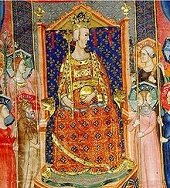




1309 On Mar. 9 nouveau riche Philip IV of France orders the papacy moved from the Lateran in Rome to a new papal court in France, but Pope Clement V, allegedly pissed-off at his treatment of the Templars fixes the papal court in Avignon in sunny SE France in the Venaissin, outside of Philip IV's jurisdiction; the Babylonian Captivity of the Church begins (ends 1377); Villandraut Castle (Chateau de Villandraut) is built by Bertrand the Goth for the popes in Avignon, and they stay there until 1377, followed by the Avignonese popes of the Western Schism of 1378-1417, causing the Lateran to begin to fall into ruin. In Mar. Robert I holds his first parliament in St. Andrews, where he gets the Scottish nobles and clergy to declare loyalty to him and denounce John Balliol as Edward I's puppet; Robert then forbids all mention of the disgraced Balliol Dynasty while claiming his own direct and lawful succession from Alexander III, bypassing the bum even in the charts, getting Philip IV of France to recognize his kingship; he begins a campaign to clear his remaining English and Scottish enemies from the garrisons S of Perth and Dundee. On May 5 king (since Jan. 7, 1285) Charles II the Lame (b. 1254) dies, and his son Robert the Wise of Anjou (1277-1343) becomes king of Naples (until Jan. 20, 1343). With help from Alonzo Perez de Guzman of Aragon (1256-1309) (founder of the Medina Sidonia family) (a turncoat Muslim from Morocco, whose family covers their Muslim past up?), who defends Tarifa from Muslim attacks, Ferdinand IV of Castile (1285-1312) finally captures Gibraltar from the Moors, who held it since the big invasion of 711; the Moors recapture it in 1333. John of Luxembourg (b. 1296) becomes count of Luxembourg. Duke Arthur II of Brittany convokes the first estates-gen. in Brittany, becoming the first time in French history that the third estate (commoners, i.e., workmen) is represented (1=knights, 2=clerics). The Order of Hospitalers (Knights of St. John of Jerusalem) begins conquering Rhodes (ends 1310). Architecture: The Municipal Palace of Siena (begun 1288) is finished, ending up holding many paintings by the Sienese School. The Teutonic Knights move their capital from Venice to the brick abbey-fortress of Marienburg (Malbork) in Wurzburg 50 mi. SW of Danzig (built in 1276), fortifying it; it becomes the home of the grandmaster of the Teutonic Knights, and the largest fortress of the Middle Ages. Construction of a new Doge's Palace in Venice begins on the site of earlier palaces (ends 1438). Inventions: Paper is first used in England; and it comes from Spain?; meanwhile paper money in China is depreciated to counter printing press inflation. Marchetto (Marchettus) of Padua (1274-?) pleads for the introduction of counterpoint into musical composition. Nonfiction: Jean of Joinville (1224-1317), Vie de Saint Louis (Life of St. Louis) (Livre des Saintes Paroles et des Bons Faiz de Nostre Saint Roy Looÿs); a bio. of King Louis IX the Saint and the Seventh Crusade which he wrote under the atronage of Queen (since 1285) Jeanne (Joan) (Johanna) I of Navarre (1273-1305), wife of Philip IV, and presents to the future Louis X. Births: German scholar ("northern successor of Albertus Magnus") Conrad (Konrad) von Megenberg (d. 1374) in Mainberg (Mebenberg?) near Schweinburt, Bavaria. Deaths: Italian nurse St. Alda (b. 1249). French king of Naples-Sicily Charles II the Lame (b. 1254) on May 5 in Naples. Spanish military hero Alonzo Perez de Guzman "El Bueno" of Aragon (b. 1256); his family stages a coverup of their Muslim past?